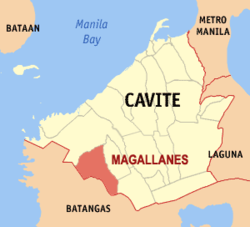Magallanes, Cavite
| Magallanes | |
|---|---|
| Municipality | |
| Motto: An Eco-Tourism Center | |
 Map of Cavite showing the location of Magallanes |
|
| Location within the Philippines | |
| Coordinates: 14°11′N 120°45′E / 14.18°N 120.75°ECoordinates: 14°11′N 120°45′E / 14.18°N 120.75°E | |
| Country | Philippines |
| Region | CALABARZON (Region IV-A) |
| Province | Cavite |
| District | 7th District of Cavite |
| Founded | 1916 |
| Barangays | 16 |
| Government | |
| • Mayor | Jasmin Angelli Maligaya-Bautista |
| • Vice Mayor | Renato Maligaya Dimapilis |
| Area | |
| • Total | 73.07 km2 (28.21 sq mi) |
| Population (2015 census) | |
| • Total | 22,727 |
| • Density | 310/km2 (810/sq mi) |
| Time zone | PST (UTC+8) |
| ZIP code | 4113 |
| IDD : area code | +63 (0)46 |
| Income class | 4th class |
| Website | www |
Magallanes is a fourth classmunicipality in the province of Cavite, Philippines. According to the 2015 census, it has a population of 22,727 people.
The town is named after Ferdinand Magellan.
Magallanes is situated about 97 kilometres (60 mi) south of Manila. Maragondon bounds the town on the north while the municipality of General Emilio Aguinaldo borders the north-east. Alfonso shares its southeast limits, while Nasugbu, Batangas is at the southern end. Classified as one of the upland communities of the province, Magallanes is situated about 2,000 feet (610 m) above sea level.
Magallanes is politically subdivided into 16 barangays.
Magallanes began its history as a barrio called Panitan, then a part of the municipality of Maragondon. Panitan was derived from the Tagalog word "panit", meaning "to remove the bark of a tree". Long before the coming of the Spaniards, there grew along the mountainside of this barrio big trees called bitangcol which provide a source of income for the people. The barks of the trees are removed (panitan) and used as containers for storing palay or unhusked rice. The fibers of the barks were removed and twined into durable ropes. Because of this unusual occupation of the people the barrio came to be known as Panitan or Banitan.
The first inhabitants of Panitan were Isidro Baltao, Glicerio Manalo, Florentino Mojica, and Ignacio Arat. Time came when the people, tired of travelling the long distance to the poblacion of Maragondon, decided to seek the separation of the barrio and its conversion into an independent municipality. Isidro Baltao headed a three-man delegation to Manila to petition the Spanish Governor-General Domingo Moriones for the conversion of Panitan into a town.
...
Wikipedia

